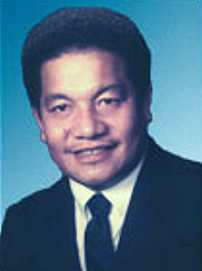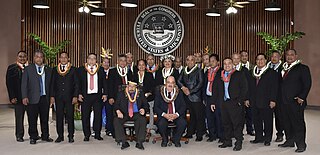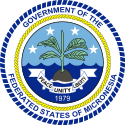
The politics of the Federated States of Micronesia (FSM) takes place in a framework of a federal assembly-independent representative democratic republic. The President of the Federated States of Micronesia is both head of state and head of government. Executive power is exercised by the president and his cabinet, while legislative power is vested in both the president and the Congress. The judiciary is independent of the executive and the legislature.

Joseph John "Joe" Urusemal is a Micronesian political figure who served as the sixth President of the Federated States of Micronesia from 2003 until 2007.

The president of the Federated States of Micronesia is the head of state and government of the Federated States of Micronesia (FSM). The FSM president, by virtue of his or her office, is the head of the FSM Cabinet and is in charge of the administration and operations of the National Government. The president is assisted by the vice-president, both of whom are elected by the FSM Congress from among the at-large members to serve for four-year terms. The current and tenth president of the FSM is Wesley Simina, who replaced David Panuelo on 11 May 2023.

John Richard Haglelgam is a Micronesian former politician who served as the second President of the Federated States of Micronesia.

The Congress of the Federated States of Micronesia has 14 non-partisan members: ten members elected for a two-year term in ten single-seat constituencies and four members elected for a four-year term, one from each state at-large.

Indirect presidential elections were held in the Federated States of Micronesia on May 11, 2007.

Parliamentary elections were held in the Federated States of Micronesia on 6 March 2007, alongside a double referendum. Thirty-five candidates competed for the fourteen seats in Congress. As there were no political parties, all candidates ran as independents.

Parliamentary elections were held in the Federated States of Micronesia on 8 March 2005, alongside a three-part referendum. As no political parties existed, all 23 candidates for the 10 available seats in Congress ran as Independents.

Emanuel "Manny" Mori is a Micronesian politician who served as President of the Federated States of Micronesia from 11 May 2007 to 11 May 2015.

Parliamentary elections were held in the Federated States of Micronesia on 7 March 1989 alongside a referendum on electing a Constitutional Convention. All candidates for seats in Congress ran as independents. The referendum was held in compliance with article 2, section 9 of the constitution, which specified that there must be a referendum on convening a Constitutional Convention at least every ten years. It was approved by 71% of voters, and the Constitutional Convention election was subsequently held in 1990.
Robert Ruecho is a Micronesian politician and diplomat. Ruecho served as the Governor of Yap, one of the four states which make up the Federated States of Micronesia (FSM), from 2003 to 2007. He became the Consul-General for FSM on neighboring Guam on October 17, 2011.
Gerson Jackson is a Micronesian politician and diplomat.

A six-part referendum was held in Palau on 2 November 2004 alongside the country's general elections. Voters were asked questions on summoning a Constitutional Convention, payment of members of the National Congress, creating a unicameral Congress, term limits for Congress members, election of the President and Vice President and dual citizenship. All proposals were approved except the unicameral Congress, which despite receiving a majority of the public vote, did not meet the quorum of 12 of 16 states required for amendments to the constitution.

A four-part referendum was held in the Federated States of Micronesia on 1 July 1999. Voters were asked whether a constitutional convention should be called, whether they approved of a proposal on the distribution of revenues from the country's exclusive economic zone (EEZ), whether the amount of tax revenues distributed to the states should rise from 50% to 70%, and whether states should be given exclusive ownership of their natural resources. The latter three had originally been planned to be held alongside the parliamentary elections in March, but were postponed due to a lack of funds to print the ballot papers.

A constitutional referendum was held in the Federated States of Micronesia on 27 August 2002. Voters were asked whether they approved of 14 separate amendments to the country's constitution. To be approved, the proposal required at least 75% of voters in at least three of the four states to vote in favour. Ultimately all 14 proposals were rejected, as none passed the 75% threshold in any state.
The nationality law of the Federated States of Micronesia determines who is or may become a citizen or national of the Federated States of Micronesia (FSM). Article III of the Constitution of the Federated States of Micronesia provides the basis for nationality law, while specific provisions are elaborated in 7 FSMC § 201 et seq.

An independence referendum for Chuuk State to secede from the Federated States of Micronesia was originally scheduled to take place in March 2015. However, it has been delayed three times and it is uncertain if it will take place. The most populous of the four states within the FSM, Chuuk has high levels of unemployment and there are long-standing tensions over the distribution of funding within the FSM. Other concerns include political power within the federation and the preservation of cultural identity.

Parliamentary elections were held in the Federated States of Micronesia on 7 March 2017, alongside a referendum on allowing dual citizenship. Although the proposed constitutional amendment to allow dual citizenship was approved by a majority of voters, it did not pass the threshold of 75% voting in favour in at least three of the four states.

Parliamentary elections were held in the Federated States of Micronesia on 5 March 2019, alongside a referendum on calling a Constitutional Convention. All 14 seats in Congress were up for election, and all 13 incumbents standing for re-election were returned to Congress.

A referendum on nine proposed amendments to the constitution was held in Micronesia on 4 July 2023. Eight of the amendments were proposed by the Constitutional Convention elected in 2019, and one amendment was proposed by Congress. All nine amendments passed, and were officially ratified by President Simina on 4 October 2023.








